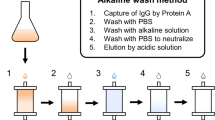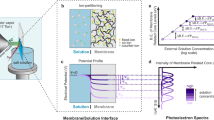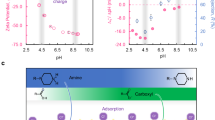Abstract
A COMPARISON of the efficiency of various eluants in ion-exchange separations of the lanthanons1 has led to the hypothesis that the relative values of eluants (and the optimum conditions of their employment) may be simply related to the overall stability constants of the complexes formed between the lanthanon ions and the eluting agent.
This is a preview of subscription content, access via your institution
Access options
Subscribe to this journal
Receive 51 print issues and online access
$199.00 per year
only $3.90 per issue
Buy this article
- Purchase on Springer Link
- Instant access to full article PDF
Prices may be subject to local taxes which are calculated during checkout
Similar content being viewed by others
References
Vickery, J. Chem. Soc. (in the press).
Schwarzenbach and Freitag, Helv. Chim. Acta, 34, 1492, 1503 (1951).
Fitch and Russell, Anal. Chem., 23, 1469 (1951).
Author information
Authors and Affiliations
Rights and permissions
About this article
Cite this article
VICKERY, R. Ion-Exchange Elution Series. Nature 170, 665–666 (1952). https://doi.org/10.1038/170665b0
Issue Date:
DOI: https://doi.org/10.1038/170665b0
This article is cited by
Comments
By submitting a comment you agree to abide by our Terms and Community Guidelines. If you find something abusive or that does not comply with our terms or guidelines please flag it as inappropriate.



